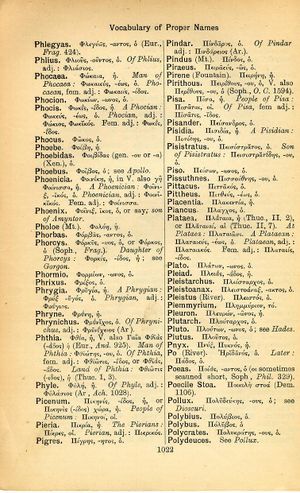Pollux: Difference between revisions
τῇ διατάξει σου διαμένει ἡ ἡμέρα ὅτι τὰ σύμπαντα δοῦλα σά → the day continues by thy arrangement; for all things are thy servants
(3) |
m (Text replacement - "(|thumb)\n(\|link=)" to "$1$2") |
||
| Line 1: | Line 1: | ||
{{WoodhouseENELnames | {{WoodhouseENELnames | ||
|Text=[[File:woodhouse_1022.jpg|thumb | |Text=[[File:woodhouse_1022.jpg|thumb|link={{filepath:woodhouse_1022.jpg}}]][[Πολυδεύκης]], -ου, ὁ; see [[Dioscuri]]. | ||
|link={{filepath:woodhouse_1022.jpg}}]][[Πολυδεύκης]], -ου, ὁ; see [[Dioscuri]]. | |||
}} | }} | ||
{{Lewis | {{Lewis | ||
Revision as of 16:55, 18 May 2020
English > Greek (Woodhouse)
Πολυδεύκης, -ου, ὁ; see Dioscuri.
Latin > English (Lewis & Short)
Pollux: ūcis (collat. form of nom. Pol-lūces, Plaut. Bacch. 4, 8, 53; cf. Varr. L. L. 5, § 73 Müll.—
I Voc. pol, edepol,
v. infra), m., = Πολυδεύκης, a famous pugilist, son of Tyndarus and Leda, and brother of Castor, in connection with whom, as the constellation of the Twins (Gemini, v. 2. Castor), he serves as a guide to mariners, Cic. N. D. 3, 21, 53; id. Leg. 2, 8, 19; Hyg. Fab. 14; 173: ita me ... Castor, Polluces ... dique omnes ament, Plaut. Bacch. 4, 8, 53; Aug. Civ. Dei, 4, 27.—Poet.: geminus Pollux, i. e. Castor and Pollux, Hor. C. 3, 29, 64: facere aliquem de Polluce Castora, i. e. to make a knight of a pugilist (pugil), Mart. 7, 57, 1.— As a deity: DEVS VINCIVS POLLVX, Inscr. Rein. cl. 1, n. 218.—In voc., contr. pol, and length. edepol (aedep-), interj. (cf.: ecastor, equirine, etc.), by Pollux! indeed! truly! pol mihi fortuna magis nunc defit quam genus, Enn. ap. Cic. Tusc. 3, 19, 44 (Trag. v. 394 Vahl.); id. ap. Macr. S. 6, 1 (Ann. v. 100 ib.); Caecil. 190; Com. Fragm. p. 67 Rib.; Plaut. Aul. 2, 7, 2: per pol quam paucos reperias meretricibus fideles, Ter. Hec. 1, 1, 1: pol, me miserum, patrone, vocares, Hor. Ep. 1, 7, 92; 2, 2, 138.—In connection with other particles of affirmation: pol profecto, indeed, truly, Plaut. Men. 5, 9, 5: certe pol, Ter. Eun. 4, 5, 5: sane pol, id. And. 1, 4, 2: pol vero, id. Phorm. 5, 8, 65.— In the form edepol: certe edepol scio, Plaut. Am. 1, 1, 115: credo edepol equidem dormire Solem, id. ib. 126; 180.—With other particles: ne edepol, Plaut. Am. 1, 1, 27: non edepol volo profecto, id. ib. 1, 1, 215: certe edepol, id. ib. 1, 1, 243: immo edepol vero, id. Most. 3, 2, 78.
Latin > French (Gaffiot 2016)
Pollūx,¹¹ ūcis, m. (Πολυδεύκης), fils de Léda, frère de Castor : Cic. Nat. 3, 53 ; Leg. 2, 19 || v. Polluces.
Latin > German (Georges)
Pollūx, ūcis, m. (Πολυδεύκης), Sohn des Tyndarus (od. des Jupiter) und der Leda, Bruder des Kastor, als Faustfechter (pugil) od. Fechter mit dem Cästus berühmt, wie Kastor als guter Reiter, Cic. de legg. 2, 19. Hyg. fab. 14 u. 173: Pollux uterque, Kastor u. Pollux, Hor. carm. 3, 29, 64. – dah. Castora de Polluce facere alqm = equitem de pugile, Mart. 7, 57, 1. – / Altlat. Form Pollūcēs, is, m., Plaut. Bacch. 894. Varro LL. 5, 73: u. Polōcēs, Corp. inscr. Lat. 1, 55.
Latin > English
Pollux Pollucis N M :: Pollux; (son of Tyndarus and Leda, twin of Castor)

